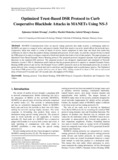Optimized Trust-Based DSR Protocol to Curb Cooperative Blackhole Attacks in MANETs Using NS-3

View/
Date
2020-05Author
Mwangi, Ephantus G.
Muketha, Geoffrey M.
Kamau, Gabriel N.
Metadata
Show full item recordAbstract
MANETs Communication relies on special routing protocols that make security a challenging endeavor. MANETs are open to a range of active and passive attacks; black hole attack is an active attack affects the network layer. Cooperative black hole attack is a form of denial of service attack comprised of more than one black hole nodes that collaborate in order to drop data packets during communication process. In our study, we used the concept of trust to extend the DSR protocol in order to mitigate cooperative black hole attacks that leads to loss of data packets. The paper proposes an Optimized Trust-Based Dynamic Source Routing protocol. The proposed protocol integrates dynamic trust and friendship functions in the standard DSR protocol. The proposed protocol was designed, implemented and simulated in Network Simulator version 3 (NS-3). Simulation results indicate that the proposed protocol is superior to standard Dynamic Source Routing (DSR) protocol and Ad hoc On Demand Vector (AODV) protocols used as the benchmark protocols; in terms of packet delivery ratio, routing overhead and end-to-end delays and throughput used as performance metrics. The Optimized Trust-Based DSR protocol had a packet delivery ratio of above 95%, routing overhead of about 4.75% and an end-to-end delay of between 0.9 seconds and 1.65 seconds and a throughput of 95.6 Kbps.
Collections
- Journal Articles (CI) [118]
